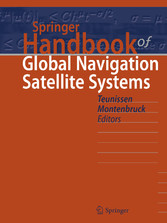Search and Find
Service
Springer Handbook of Global Navigation Satellite Systems
This Handbook presents a complete and rigorous overview of the fundamentals, methods and applications of the multidisciplinary field of Global Navigation Satellite Systems (GNSS), providing an exhaustive, one-stop reference work and a state-of-the-art description of GNSS as a key technology for science and society at large.
All global and regional satellite navigation systems, both those currently in operation and those under development (GPS, GLONASS, Galileo, BeiDou, QZSS, IRNSS/NAVIC, SBAS), are examined in detail. The functional principles of receivers and antennas, as well as the advanced algorithms and models for GNSS parameter estimation, are rigorously discussed. The book covers the broad and diverse range of land, marine, air and space applications, from everyday GNSS to high-precision scientific applications and provides detailed descriptions of the most widely used GNSS format standards, covering receiver formats as well as IGS product and meta-data formats.
The full coverage of the field of GNSS is presented in seven parts, from its fundamentals, through the treatment of global and regional navigation satellite systems, of receivers and antennas, and of algorithms and models, up to the broad and diverse range of applications in the areas of positioning and navigation, surveying, geodesy and geodynamics, and remote sensing and timing.
Each chapter is written by international experts and amply illustrated with figures and photographs, making the book an invaluable resource for scientists, engineers, students and institutions alike.
Peter Teunissen is a Professor of Geodesy and Satellite Navigation at Curtin University, Australia, and Delft University of Technology (TU Delft), the Netherlands. His research is focused on developing theory, models and algorithms for high-accuracy geospatial applications of new global and regional satellite navigation systems. His pioneering contributions to the field include statistical and numerical methods of integer inference theory, innovative algorithms for multi-GNSS precise parameter estimation, and the early characterization and utilization of the Chinese BeiDou, the Indian IRNSS and the Russian GLONASS CDMA system. His scientific contributions have been recognized through various awards including the Bomford Prize, the Steven Hoogendijk Prize and the Alexander von Humboldt Award. He holds an Honorary Degree from the Chinese Academy of Sciences and is a Fellow of the International Association of Geodesy (IAG), the UK Royal Institute of Navigation (RIN), the US Institute of Navigation (ION) and the Royal Netherlands Academy of Sciences (KNAW).
Oliver Montenbruck is Head of the GNSS Technology and Navigation Group at the DLR's German Space Operations Center, Oberpfaffenhofen and Chair of the Multi-GNSS Working Group of the International GNSS Service. His research activities comprise space borne GNSS receiver technology, autonomous navigation systems, spacecraft formation flying and precise orbit determination. More recently, he has focused on the characterization of new satellite navigation systems and multi-GNSS processing. Pioneering contributions in this field included GIOVE and GPS signal investigations based on high-gain antenna measurements, the establishment of the Cooperative Network for GNSS Observation (CONGO), and the evaluation of triple-frequency signals, as well as the early characterization and utilization of the Chinese BeiDou navigation system. His scientific contributions have been recognized through various awards including the DLR Senior Scientist Award, the Institute of Navigation's (ION) Tycho Brahe Award, and the GPS World Leadership Award.
All prices incl. VAT












